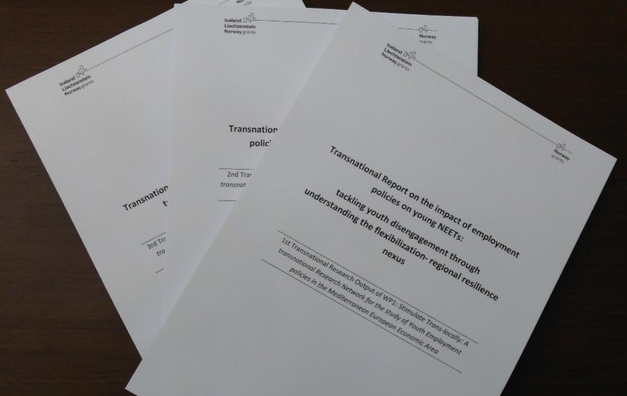Three scientific reports have been prepared and presented by the YOUTHShare project representing the diligent transnational cooperation of the research team. The reports focus on impact analysis of recent public policies regarding employment, social and sharing economy and training. They already play a pivotal role on the development of new intervention strategies for NEETs.
The delivery of those three reports marks a significant milestone reached by the YOUTHShare project. After sixteen months of meticulous research design, data collection following various methods and impact assessment, the research teams prepared elaborate scientific reports that elucidate core issues of the NEETs phenomenon in Greece, Cyprus, Italy and Spain.
The first transnational report on The Impact of Employment Policies on Young NEETs: Tackling youth disengagement through understanding the flexibilization- regional resilience nexus performs a thorough quantitative meta-analysis of the dynamic number of NEETs supported by in-depth interviews with NEETs and various stakeholders from employment services in the target regions and countries between 2008 and 2018. The main authors of the report, all affiliated with the University of the Aegean, Effie Emmanouil, doctoral researcher funded by the YOUTHShare project, Dr Stelios Gialis, Associate Professor, and Dr Ioannis Papageorgiou, researcher, along with the contribution of the YOUTHShare project research team, assessed the impact of contemporary employment policies in Southern Europe. The report identifies certain trends in the number of NEETs that reaches an alarming level in particular regions. The socio-economic profile of those regions reveals that the resilience of the local economy is a necessary but not sufficient prerequisite for the reduction of NEETs rates.
The second transnational report on The Impact of Employment Policies on Social and Sharing Economies draws upon official data from the sectors of social and sharing economies and their influence upon employment in target regions and countries. Interviews with key actors in the pertinent fields shed light upon aspects of the sectors. The main authors of the report from the University of the Aegean, Athina Avagianou, doctoral researcher funded by the YOUTHShare project, and Dr Sofia Karampela, researcher, and from the Neapolis University Pafos, Dr Ioannis Pissourios, Assistant Professor, and Elena Polydorou, doctoral researcher, along with the contribution of the YOUTHShare project research team, identified size and spatial trends in social and sharing economies in Greece, Cyprus, Italy and Spain based on the insightful perspective acquired by a multiscalar method. The combined analysis of the trends in data and in practices and beliefs of key actors reveal the uneven expansion of social and sharing economies across the countries under focus along with their resilience in general terms. For both sectors, however, their impact upon employment is either insufficient (social economy) or debatable and precarious (sharing economy).
The third transnational report on The Impact of Education and Training Initiatives on Young NEETs employs an in-depth analysis of rich qualitative data from the target countries and more specifically young NEETs, individuals involved in training policies, employment advisors and other key informants. The main authors of the report Carlos Pesquera Alonso, doctoral researcher at the Catholic University of Murcia funded by the YOUTHShare project, and Anne Hege Strand, researcher at the Fafo Institute for Labour and Social Research, along with the contribution of the YOUTHShare project research team, performed an impact assessment of training policies and services focusing mainly on the effectiveness of the central ‘Youth Guarantee’ scheme of the EU. Within an environment of high and prolonged NEETs’ rates the training policies implemented, including the ‘Youth Guarantee’ hardly offer any actual assistance for NEETs; while it may be sustaining jobprecariousness because of the type of training offered more often.
That essential and extensive corpus of scientific work, amounting to approximately 600 pages, has been the result of the transnational cooperation between the academic, research and managerial staff of the University of the Aegean (Greece), Neapolis University Pafos (Cyprus), the Catholic University of Murcia (Spain), Sistema Turismo (Italy), Fafo Institute for Labour and Social Research (Norway) and the Cyprus Authority of Co- operative Societies (Cyprus). The successful delivery of enterprises such as the three reports, further embeds the cooperation between the project partners and consolidates the YOUTHShare Transnational Research Centre.
Having reached the milestone represented in the delivery of the three transnational reports, the YOUTHShare project has now acquired essential insights allowing for an informed design of the intervention strategy for NEETs in Greece, Cyprus, Italy and Spain. It appears that unemployment, and particularly the NEETs phenomenon, present such structural features that cannot be addressed though fragmented or case-specific policies. Contrariwise, unchecked unemployment, precariousness and flexibilisation could be potentially harnessed through skills acquiring in resilient, social and sharing sectors of the economy within a regionallysensitive approach. The three transnational reports of the YOUTHShare project confirm that “One size, doesn’t fit all”.


